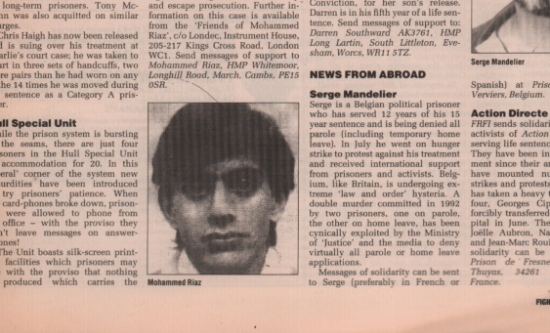
20 Years for Murder of an Indian Diplomat, Mo Riaz, 2022, Gadfly Press
Mohammed Riaz was a 21-year-old student in Leicester in 1983 when he was caught up in a plot to kidnap an Indian diplomat to demand the freedom of Maqbool Ahmad Butt, a leading Kashmiri freedom fighter who was on death row. Riaz’ family had migrated to England from Kashmir and he was supportive but not really active in the struggle for Kashmiri liberation. The kidnap did not go to plan and the diplomat was killed. The main protagonists managed to leave the country, leaving Riaz and some other minor players to face trial for murder. Sentenced to life imprisonment, he served 20 years before being released in 2004.
Mo’s account of his time in prison is a fascinating read; however the old adage ‘don’t judge a book by its cover’ is never truer. Having written this book ten years ago, and failed to find a publisher, Riaz’ autobiography has now been produced by a company which mainly puts out sensationalised ‘true crime’ books. What was originally called ‘Fighting for Freedom’ is somewhat misleadingly retitled, while the cover features a photo of the author flanked by London gangster Reggie Kray and ‘celebrity prisoner’ Charles Bronson, despite these two appearing only fleetingly in the book.
Riaz is a talented writer and combines gripping narrative with relevant political lessons about the history of British imperialism in Kashmir, the iniquities of the life sentence as a punishment and the importance of solidarity in the prison system. He vividly describes the high security prison system of the 1980s and ‘90s, when the previous pecking order in which ‘the prison warders ran the prisons, through the London gangsters’ was superseded by the arrival of Irish POWs.
Mo was in touch with Fight Racism! Fight Imperialism! through much of his sentence and there are many characters in the book who longstanding readers will recognise. Alongside the Irish and Palestinian liberation fighters, and the sole survivor of the 1980 Iranian embassy siege, there are a number of highly politicised prisoners convicted of non-political offences. Early in the book, Riaz describes how, despite being in prison for politically motivated reasons ‘before I met John Bowden, I knew little of prison politics and left-wing politics, but he gave me some books [including] Soledad Brother by George Jackson [and] I soon came to realise that prison was not just a social institution but a political one.’ Later on he describes how, during a protest in Gartree prison in 1990: ‘The left-wing prisoners [who] were the linkmen for the guys on the roof… called their cells “The Kremlin” and had a notice on their doors to that effect.’
Life sentences in Britain consist of a minimum term or ‘tariff’ of a number of years which must be served in prison, plus a licence period lasting the whole of the convicted person’s life, meaning they can be returned to prison for breaching it. Since 2005 the minimum term is set by the sentencing judge, but at the time Riaz was convicted, tariffs were set by a three-stage process involving the views of the judge, Lord Chief Justice and finally the Home Secretary. Until 1994 this process was shrouded in secrecy, with prisoners not knowing how long they must minimally stay in prison. Riaz had been behind bars for over a decade when he first discovered that the judge had recommended he serve a minimum of ten years – a low tariff in recognition of his minor and peripheral role in the murder. The Lord Chief Justice had increased this to 16 and the Home Secretary, Leon Brittan, doubled the initial recommendation to 20 years. Following a legal challenge in 1995, this was reviewed, only to be reset at the same 20 years by another Tory Home Secretary, Michael Howard.
Those 20 years clearly took their toll and the book does not shy away from describing beatings, drug addiction, destruction of relationships and the everyday grind of prison life in a brutal system, which at some points the author wonders if he will come through alive. This is, however, predominantly a story about survival and solidarity.
Nicki Jameson




